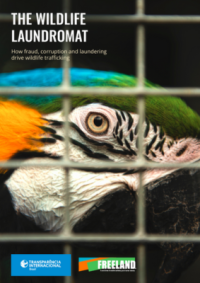Wildlife trafficking generates billions of dollars annually for criminal networks worldwide and impacts biodiversity, animal welfare, and the spread of new infectious diseases. Wildlife crime is sustained by a complex network of corruption, fraud, and asset laundering, including money and the wildlife itself, which needs to be understood to tackle the issue in an cohesive and effective manner.
The report “The Wildlife Laundromat: How risks of fraud, corruption, and laundering drive wildlife trafficking“, produced by Transparency International – Brazil, with technical support from Freeland Brazil, analyzes 18 cases and operations combating wildlife trafficking in various regions of the country.
The report evidenced 24 practices of fraud, corruption, and laundering within the supply chain of the illegal wildlife trade, along with the objectives of each of these practices and the types of actors involved.
To tackle the issue, the report also brings forth a series of recommendations, including the creation of a national strategy to combat wildlife trafficking, the mobilization of anti-corruption and anti-money laundering mechanisms, the strengthening of fraud prevention in wildlife control systems, the promotion of transparency and digital transformation, and increasing accountability for traffickers.
This report is part of the project “Countering Wildlife Trafficking in Central and South America,” coordinated by Freeland with the support of the United States Bureau of International Narcotics and Law Enforcement Affairs (INL) and in partnership with Transparency International Brazil, WWF Brazil, and IFAW. Aiming to enhance the effectiveness of combating wildlife trafficking at the regional scale, the project seeks to increase the detection and ban of these illicit activities, reinforce investigative and international cooperation capacities, improve criminal prosecution and ruling capabilities, and strengthen transparency and efforts to combat related corruption and asset laundering.
